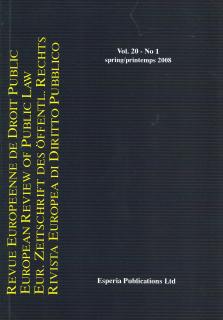
Citizens and European Security
The Rt Hon The Lord Laws
Lord Justice of Appeal, Royal Courts of Justice, United Kingdom
The author proposes to interpret the phrase “jurisdictional protection against acts and practices of the European security” as referring principally to the protection of civil liberties, by legal rules or norms, against greater assaults on such liberties by security measures primarily (but not necessarily exclusively) directed at the terrorist threat. The author mentions some particular areas where there has been recent activity at the European level. EU initiatives or aspirations are capable - all of them - of having profound effects on the civil rights and liberties of those affected, notably suspected criminals and asylum-seekers. In particular European legislation affecting - or even defining - the procedural rights of defendants in domestic criminal trials would have profound effects on the legal traditions of the Member States in an area - criminal law - where, perhaps, the differences between those traditions (certainly between the civil law and the common law systems) are most clearly marked. The author concentrates on the dichotomy - or rather dilemma? - of the protection against terrorist crime versus civil liberties; and poses the question: How are lawmakers to decide how this balance is to be struck? In addressing the question, the author touches on three areas: religious fundamentalism, the margin of discretion the State should enjoy in framing security measures, and the need for trust and confidence between citizen and the State.





















